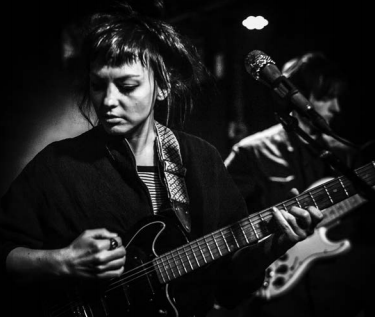Spotlight: Angel Olsen

Let’s make it clear right off the bat: Angel Olsen does not listen to Joni Mitchell. Sure, as a singer-songwriter, she feels some level of kinship with the folk-rock songstress, and she might even acknowledge the “steely vulnerability” of Mitchell’s music as a quality that resonates in her own work. But Olsen’s muses are a quirky bunch. From The Velvet Underground, Leonard Cohen and Neil Young to the ChiLites, Jackie DeShannon and Candi Staton, the 29-year-old St. Louis native draws from a wealth of influences to create songs that burrow under your skin and cut straight to the marrow of life and love.
With her stunning voice— at times wounded and mystical, at others stoic and fierce— Olsen managed to recast indie-rock Americana in her own image on 2014’s Burn Your Fire for No Witness, which surged on the strength of the hauntingly Orbison-esque rocker “Hi-Five” and the chilling ballad “Windows,” among others. She recorded that album in Asheville, N.C., where she now lives—a far cry from the bustling Chicago scene that she called home for seven years.
“When I wrote Burn Your Fire, I was thinking I had experienced all these heavy things in life,” Olsen says with an uneasy laugh. “I thought about myself when I was 16 reading Kierkegaard for the first time, or reading existentialist novels and trying to grasp that sense of being isolated, unfeeling and separated. And it’s cool that I knew how to articulate those ideas, but I didn’t even know that it was gonna get 10 times worse.”
She checks herself, then laughs a bit more openly. “This time, though, I feel more relaxed about the things that have disappointed me, in a new way,” she reveals, referring to her mindset during the making of her latest album, My Woman (Jagjaguwar). “It’s not like, ‘This is the end,’ you know? Some of it is very autobiographical, and other things—songs like ‘Intern’ and ‘Shut Up Kiss Me,’ the playful ones—I probably could have written years ago in my head. They’re all honest, in my opinion, but it’s on side B where I feel more like I’m shedding part of myself in those songs.”
Side B, to use the old-school vinyl term, is where My Woman gets heavy and soulful. Recording to tape at the famed Vox Studios in Hollywood, Olsen and co-producer Justin Raisen sought to capture her band— Stewart Bronaugh (guitar), Emily Elhaj (bass) and Joshua Jaeger (drums)—at their well-rehearsed peak. There’s a deep, intuitive sense of musicians actually connecting in songs like the baleful, country-tinged “Sister” and the epic, psychedelic “Woman,” which features Olsen playing an echo-drenched Mellotron to embellish Bronaugh’s haunted Wurlitzer organ, as well as a snake-bitten solo by guest guitarist Seth Kauffman.
“It just was such an organic, wonderful experience,” Olsen says. “Being able to communicate the percussiveness of a voice in a band—that’s the number one thing that I have to do all the time. And to meet people who get that is so rare. It’s just cliché to say it, but I felt like we were making history. We were allowing ourselves to play everything live and see what happens, instead of trying to put the record together in a specific way.”
Along with her newfound interest in synthesizers, which she explores to the hilt on the ‘80s-washed opener “Intern,” Olsen also tests the limits of her voice. She hits the high notes with commitment and power on the rocking, raucous “Not Gonna Kill You,” and then dials back into a wavering whisper on “Those Were the Days.” Channeling her soul heroes (Candi Staton among them) wasn’t necessarily part of the initial plan, but she felt there was a side of her voice that she hadn’t tapped into yet.
“That was a hidden challenge for me with this record,” she explains. “Yes, I care about writing, and I care about saying something important. But, sometimes, you don’t need to say anything. You just need to sing. That can be refreshing after hearing a lot of words, you know? Sometimes just doing the same grunge song over and over again isn’t gonna drive it home the same way. I really want to keep experimenting with that.”
Through it all, Olsen admits to having a chip on her shoulder, which is part of what makes My Woman such an intriguing mystery. Who is this elusive woman, anyway, and is she making a feminist statement? Not exactly.
“I’m calling it My Woman, and it’s a bold move, and people can think whatever they want,” Olsen says matter-of-factly. “That’s cool. It’s not a feminist record. I’m not afraid to talk about feminism, but it’s not really the subject of all my material. I will say, for the first time, I’m allowing myself to be part of the story. To be a writer and to articulate things, you have to admit that those things have affected you. I often overthink it and maybe get myself into trouble. My mom basically is like, ‘You’re just always looking for something to complain about.’ And then people ask me, ‘Well, what if you became a mom and your life changed, and you were happy. Would your music change?’ I don’t know, but I’ll tell you one thing: I’ll still have stuff to say about it.”



















